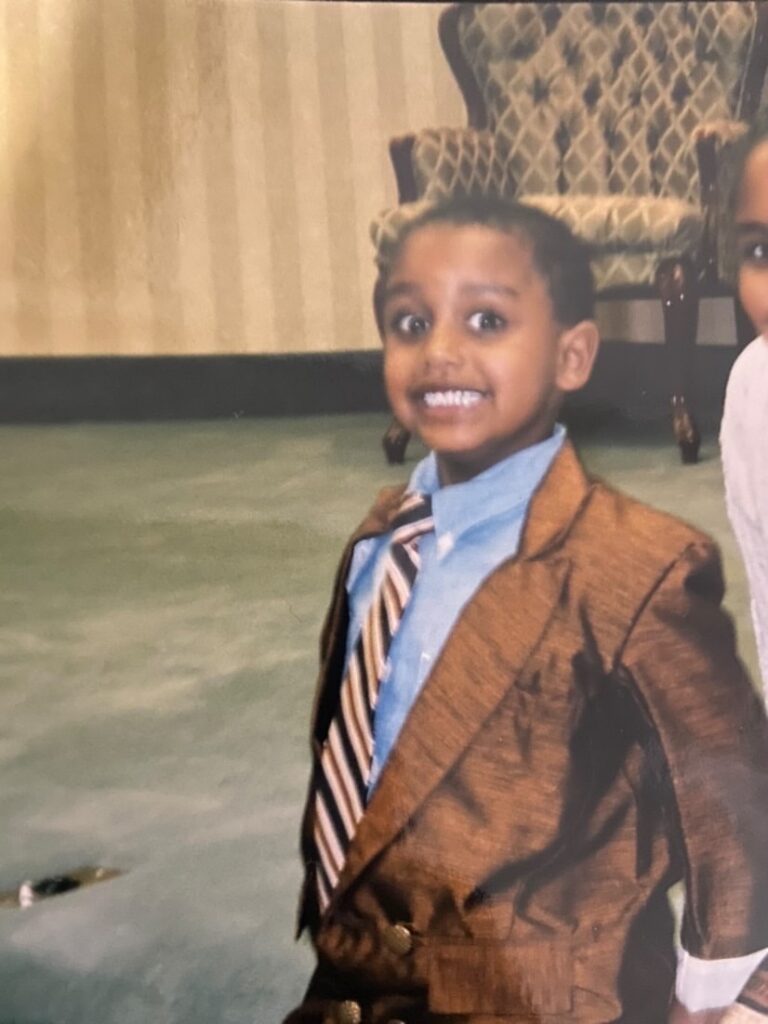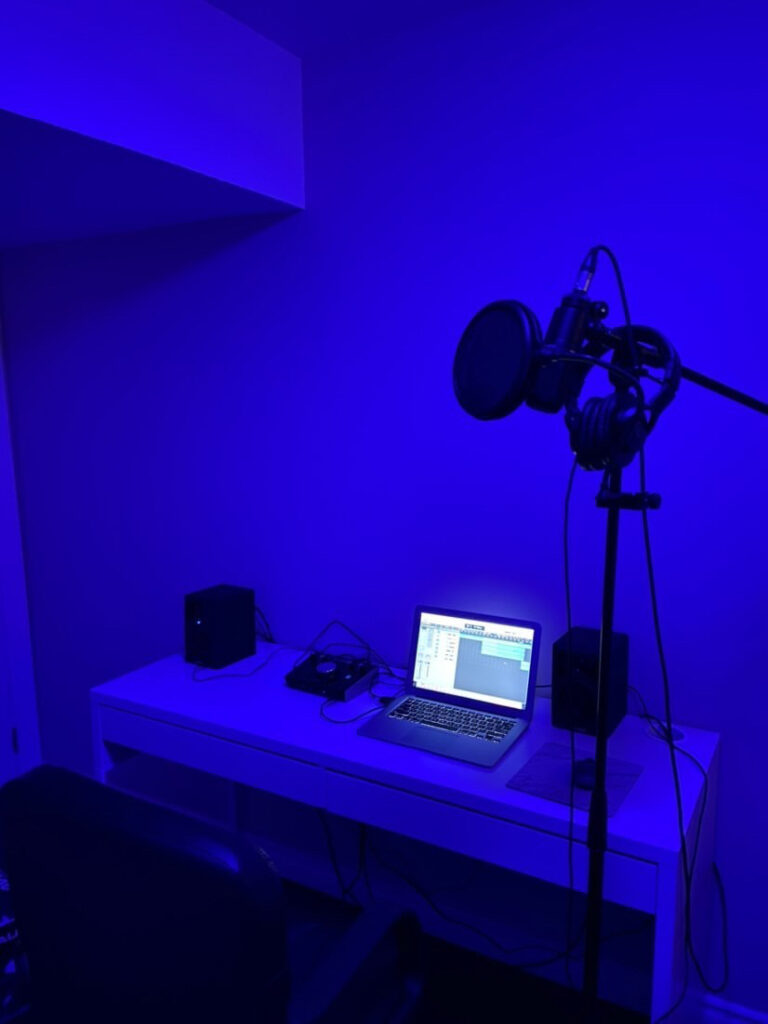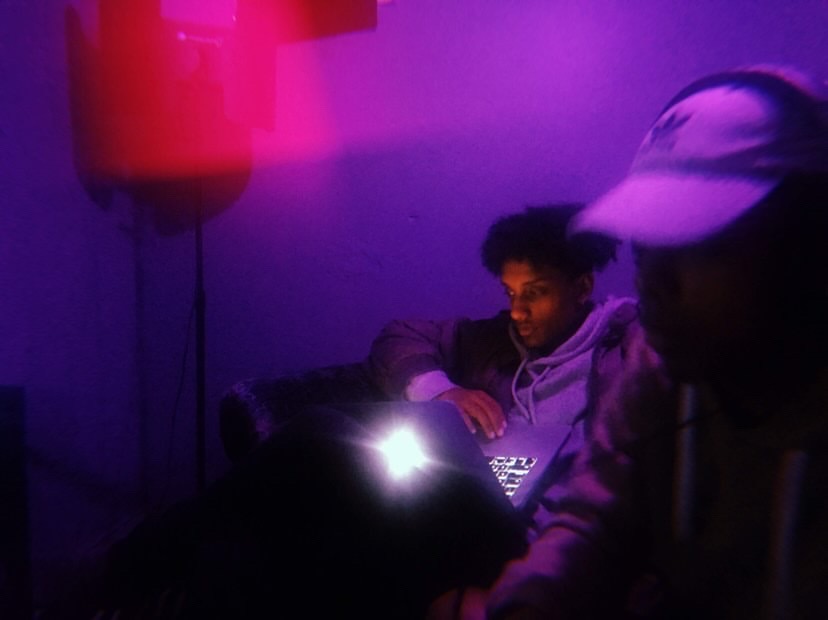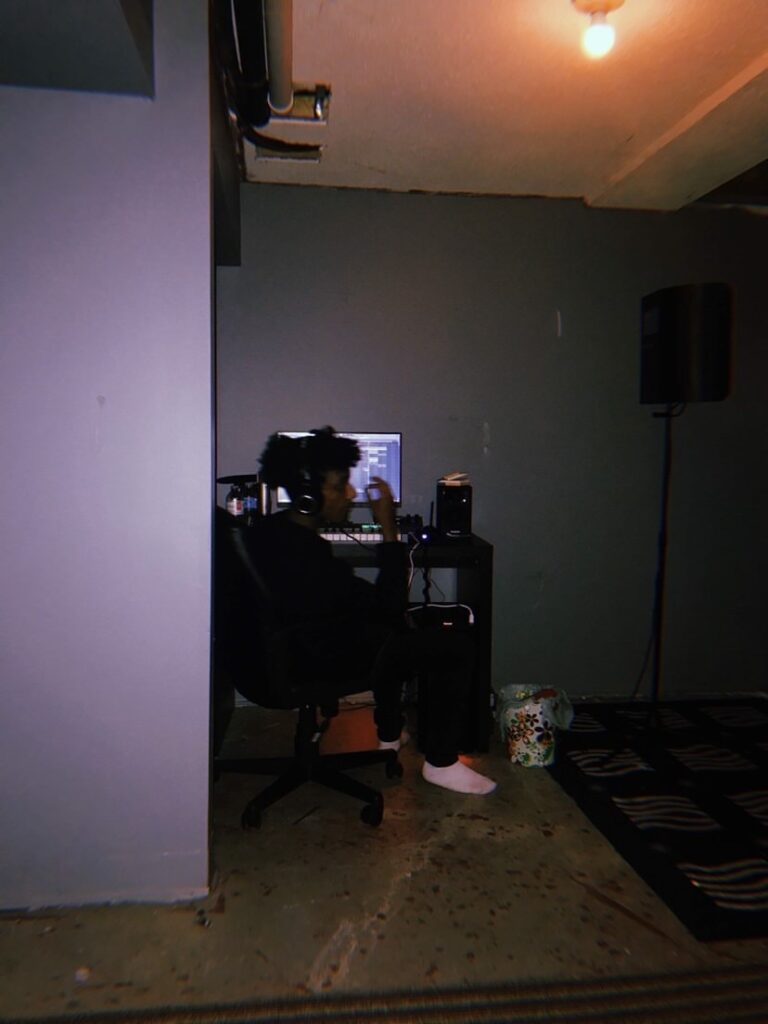By Isaac Fontes
The Mersha household was always full of tunes, as the voices of Kenny Rogers and Stevie Wonder constantly echoed the walls of their home in the west end of Kitchener, Ont. The family’s oldest sister of three siblings quickly picked up singing by belting out the R&B hits of the 2000s, adding to the chaos of a small, tight-knit household.
Her little brother, Mickey, listened attentively, completely unaware of how music was going to change his own world 11 years later.
She now just sings as a hobby and participates in jam sessions with friends, while Mickey is the sibling who’s pursuing a career as a music artist.

Mickey showing off his smile as a child at a family event. (Photo courtesy of Mickey May/T•)
He currently has close to 4,000 monthly listeners on Spotify. Four of his five most popular songs on the platform currently have well over 10,000 streams respectively, and they’re all from different projects of his.
He released his first album, 2099, in 2019 and received some local buzz from promoting it through social media and music blogs, but it also reached the camp of a high-profile rapper. “I had a couple management teams reach out to me to open up for artists. I was asked to go on tour with Snoop Dogg,” he says with a growing smile.
“But being independent, you gotta pay for your own tour. His manager gave me the breakdown of prices. My total expenses, if it was just me by myself, would’ve been something ridiculous. Between $80-100,00,” he says.
He was unable to take advantage of the opportunity and still has yet to perform a live show, but he will be performing virtually on April 30, through StudioOnSunset, a platform for smaller-scale artists to perform virtual shows amid the pandemic.
Near the beginning of March, Mickey received an email from the platform’s owner, who discovered Mickey’s music fishing through Spotify and instantly thought that his unique sound could be integrated well into a virtual show.
After agreeing on a budget, Mickey had about 30 days to get a small group of his creative friends together to direct and film a 30-minute set and submit it to be streamed at the end of April. “We took away a lot. We didn’t loose any money, we didn’t loose any time, we just learned a bunch of stuff. At the end of the day, I’m excited for everyone to see it. The process through it was crazy, but definitely exciting. It was like a little glimpse of maybe what the future holds,” says Mickey.
Mickey’s first full-length release as an independent musician, 2099, which he recorded in Ahmad’s basement and released in 2019.
Growing up, the small town of Kitchener didn’t have much to offer a kid like Mickey, who was always looking to be entertained and for a way to express himself.
“Going into high school, my focus was just on trying to get girls, sports and clothes,” says Mickey. “I tried to stay out of trouble as much as I could, but I think a lot of the trouble I got into was self-inflicted. I was just trying to fit in and do what everyone else was doing at the time.”
Throughout his teen years, music returned to being more like background noise to him. His interests laid elsewhere, as he began to surround himself with the wrong crowd.
“I had my fair shares of disappointing moments, like running into trouble with the law, but nothing too serious,” says Mickey. “The run-ins that I had kind of changed me,” he says, as his eyes wander away from the screen.
His growing maturity told him he would have to smarten up at some point. “You know, one mistake can fuck up your entire life,” recalls Mickey. “I quickly learned that shit don’t really take you far, like it takes you nowhere.”
He was having a hard time finding himself and desperately needed a creative outlet. “It could’ve been art, fashion or music like it is. It could’ve been a whole bunch of different things, but I think real life just scared the hell out of me,” says Mickey.
There’s one day of his grade 11 year he remembers vividly that would change his life path.
He was sitting uncomfortably in his plastic chair, trying to pay attention to his Law teacher. As he leaned back to stretch in another attempt to focus, he noticed that the guy sitting next to him was attentively staring at his laptop screen, occasionally bopping his head ever so slightly.
Mickey desperately wanted to know what he was doing, so he whispered to ask. The kid said he was making beats in Fruity Loops, a music production program. Mickey made a mental note. Maybe they could work together in the future if he were to pursue his dreams and make music himself.
His classmate’s name was Ahmad and while they were only acquaintances at this point, they would go on to become great friends and musical collaborators.
Ahmad produced all but two songs on Mickey’s first project, the aforementioned 2099, which they created in just three weeks. “During that time, he would just describe a feeling or a scene and I knew what he wanted and meant,” says Ahmad.
Grade 12 was when the light bulb turned on for Mickey, as the daunting question of what he wanted to study in post-secondary loomed over him.
“I remember applying for universities and just knowing this is not what I wanted to do, but it was something I was going to do to make my parents happy,” recalls Mickey.
Both he and Ahmad were accepted to the Criminology program at Laurier University, but Mickey didn’t feel the least bit excited. So he decided to hit the studio with Ahmad, an escape from the confines of classrooms and textbooks.
The studio was Ahmad’s basement. Equipped with only a couple speakers, a laptop, a little monitor and a microphone, they got to work. “We had no idea what we were doing, it was just straight dog shit,” Mickey cringes, when thinking back on his earliest performances.
He persisted on going to Ahmad’s to make music every single Friday, making the duo’s chemistry and talents improve. “I felt I wasn’t good and felt that his talent could be used by more experienced producers in the city,” says Ahmad. “Despite making trash [in the beginning], he knew that I was the only producer that could bring his vision to life.”
Part of his vision was to be a diverse artist who stands out among other independent artists. “His will to get better is something rare in most artists, as some either give up too early or are content with what they are currently making,” says Ahmad.
Less than a year into the Criminology program, Mickey decided that he couldn’t do it anymore. “I quickly realized, if I want to get to where I want to be musically, I can’t be wasting all this time on these assignments, these classes and lectures, it’s just taking so much time away from what I really want to be doing,” says Mickey.
He had the talk with his parents in late 2017, but they weren’t fully supportive right away. “It was weird for a bit. They just kinda look at who they hear on the radio and they go, ‘no, you can’t be that. You can’t be from here and get there,’” recalls Mickey.
He’s grateful that they now understand it’s what makes him happy.
Since then he’s been continuously working on his craft, which doubles down as his expressive outlet.

The stigma surrounding mental health is part of what’s made Mickey turn to music to express his feelings. “I’m not someone who’s really good at expressing my emotion in conversation, or one on one with someone. I don’t really be venting to nobody,” Mickey says as he looks away. “I vent to the mic. That’s where I feel more comfortable. That’s always been my comfort zone, so for me, it’s literally everything. Without it, I’d go insane.”
His music since 2099 is filled with intimate lyrics that reflect his emotions and mental health. “I’ve always said, I’d rather you know my music than you know who I am. Because if you know my music, then you know who I am,” says Mickey.
His latest EP, Just In Case Tomorrow Never Comes, was released in December, 2020 and it’s the most vulnerable Mickey has ever been in his music to date. He credits this to the fact that he recorded the project entirely by himself. “When you’re in a room by yourself, it’s kinda just you and your thoughts, so everything just comes out. There were no boundaries on this for me and it was just the most intimate thing that I’ve put out yet,” says Mickey.
One of his favourite parts of being an artist is when people reach out to him about how they relate to his music. There’s been a few fans who have directly messaged him to express their connection to certain songs he’s made.
He vividly remembers a fan reaching out to let him know that “Baby Driver,” off his newest EP, touched him and he related to the song. “I’m blacking out for sport, that’s something I just can’t deny / Every time I said that I was sober, oh I lied / I’m running from myself, but see, I’m running out of time,” Mickey sings on the track, allowing for the mic to act as his closest friend.
“Between 18-24 is the biggest age group that I’ve been resonating with, which I guess makes sense, in terms of the content and what I’m talking about,” says Mickey. “Then it kinda turns into, I’m not just doing this for me anymore. I’m also talking for a lot of other people too, who might not have somebody to talk to.”
This story has been updated from its original published state in order to accommodate the requested removal of a source.


